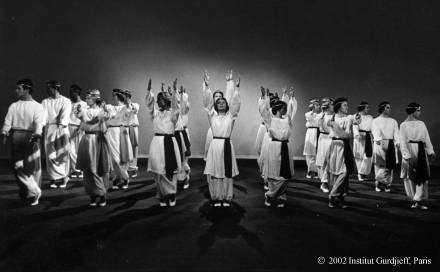
Gurdjieff was a true “teacher of dancing.” He dedicated part of his life to teaching “rhythmic exercises” which he called the “Movements.” As an opening to the intelligence, he gave them as important a place as he gave to the ideas he was trying to transmit. Josée de Salzmann, who practiced these movements for many years, answers our questions here.

Magazine Littéraire: One has the feeling that the “Movements” had an essential place in Gurdjieff’s teaching. Yet one would tend to regard them as being of minor importance alongside his written works.
Josée de Salzmann: They cannot be of minor importance because the body is important. It is an instrument. Why consider it as a hindrance to spiritual development, an obstacle to the expansion of consciousness? It has to be rehabilitated. This idea is at the very basis of what George Gurdjieff called the “Fourth Way”—a way which presupposes a harmonious development of the whole of man.
Magazine Littéraire: What, then, is the role of these “Movements?”
Josée de Salzmann: They enhance the circulation and the liberation of the energies in man. Each time George Gurdjieff showed an attitude, a gesture, he intended a very precise effect. Each position attracts a definite energy, in a definite direction and with a definite aim. From this point of view one could say that the Movements constitute a language—a language that our intellect cannot understand well but to which the body is sensitive. We think of our body as opaque, sometimes even dreaming of transforming it into something more subtle. But the subtlety is already there. Nothing is dense except the wall of inattention, of insensitivity and passivity which prevents us from seeing.
Magazine Littéraire: Do you mean that the language of Movements helps to enlighten the body just as language in words enlightens the mind?
Josée de Salzmann: It is generally recognized that our thought has to be enlightened, as do our feelings; but one does not think that this same need exists in regard to the body. The body is able to participate in the enlightenment of the whole man. If the body were excluded, the idea that man must become a whole would lose credibility.
Magazine Littéraire: Wouldn’t any rhythms, any movements, produce the same effect?
Josée de Salzmann: No. What was specific and unusual in what Gurdjieff brought was a knowledge of the laws of human functioning, and the Movements are worked out on the basis of this knowledge.
Magazine Littéraire: Would the Movements not be, then, a science?
Josée de Salzmann: Exactly. The Movements are based on a science.
Magazine Littéraire: All the same, Gurdjieff sometimes referred to the “Movements” as “Sacred Dances.” Did he just collect them in the course of his wanderings, as a young man, in the Middle East or Central Asia? Or did he create them out of his knowledge of the nature of our energies and our bodies, and of man?
Josée de Salzmann: In Meetings With Remarkable Men he makes no secret of the fact that he had access to monasteries where Sacred Dances were performed. But when we were in his presence, when he was teaching, every time it was a creation—not an improvisation, but a creation. On the one hand, I believe these Movements are not an invention; on the other hand, I think they are not a literal reproduction of dances.
Magazine Littéraire: You speak of the Movements from an essentially technical point of view. However, those who had the opportunity to witness them were struck by their beauty…
Josée de Salzmann: Beauty is a consequence, but it is not the aim. The practice of Movements merely as the pursuit of aesthetics, as gymnastics, or as physical therapy, would only lead to distortion; there would be no real benefit. It was no doubt to guard against this that George Gurdjieff always refused to allow transcription of the Movements. And so very many of them would have been lost if a few of his closest pupils had not recollected them.
| Copyright © 2002 Alexandre de Salzmann English translation © 2002 Ellen Draper and Paul Reynard This webpage © 2002 Gurdjieff Electronic Publishing Featured: Spring 2002 Issue, Vol. V (1) Revision: April 1, 2002 |
Josée de Salzmann (1923–1991) played a major role in conveying movements in Paris after Gurdjieff’s death in 1949. This interview was first published in Magazine Littéraire, Paris, No. 131, Décembre 1977, pp. 23–24.